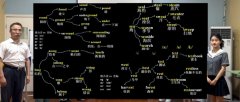北师大版丨高中必修一所有重点单词/短语/句型用法详解!
作者:未知 时间:2021-01-14 阅读:( )
1. relaxing. Relaxing是由及物动词relax +ing构成的形容词,意思是“轻松的,令人放松的”。Boring和relaxing的构词法相同,意思是"令人厌烦的,单调乏味的”。
Relaxed"放松的”和bored"无聊的”常用来修饰人;而relaxing和boring均表示“令人...的",常修饰物。
Mary felt relaxed to make a relaxing conversation with a good friend, while Peter got bored with a lot of boring homework todo.和一个好朋友的轻松交谈让玛丽感到很放松,而要做很多无聊的作业使彼得感到很厌烦。
The teacher said something relaxing to gethim relaxed, so Peter decided to dosomething satisfying to make the tachersatisfied.老师对他说了一些让人放松的事情使他放松,于是彼得决定做点儿令人满意的事情让老师满意。
2.suppose (认为,猜想)的用法。
(1)suppose+that从句,表示"猜测,假定”。
I suppose that you are right.. 我想你是对的。(2)supose+名词/代词+to be... 表示“认为...
Many people suppose him to be over 50.
许多人认为他已经50多岁了。
(3)suppose/supposing作"假定,设想"”讲,相当于连词if.
Suppose you are wrong,what will you dothen?假如你错了,你将会怎样做呢?
(4)be supposed to" 被期望做....应该做...表示劝告、建议、义务、责任等,相当于情态动词should.
Am l supposed to clean all the rooms or justthis one?我是应该打扫所有房间呢还是只这一间?
They were supposed to be here an hour ago.
(5)用于简略答语中。
→Do you think we'll have good weather thisweekend?你认为周末天气会好吗?
→ l suppose so/not.我想会吧/我想不会。
3.Imagine.
(1)imaging sb. Doing sth. 想象某人做某事
I just can imagine him saying that!我确实能想象到他那么说!
(3)imagine sb./sth.(to be)认为某人/某事...Don't imagine your husband to be always wrong.
(4)imagine+that从句想象,误认为
Your can't imagine he should make such amistake.你不到他竟然犯了这样的错误。
4.forty-three-year-old是复合形容词,作定语,其中year不能用复数。
5.until到.... (时间、地点)为止
He stayed here until twelve o'clock.
他在这里一直待到十二点。
Until还可以作连词。
not..until... 意思是“直到.......
He will not give you any answer until he hasthought it over.他对此事仔细考虑之后才会给你答复。
6.与“开、关”有关的词
(1)open/close/shut与door, window, box,book,eyes等连用
(2)switch on/off多与radio, TV, light, computer等连用
(3)turn on/off 比switch on/off更 通俗,多与radio, gas, water等连用。
7.while引导时间状语从句,意思是“当...的时候,....同时”,表示两个动作同时进行或两种状态同时存在。
He was still studying while the others were sleeping.
While还可以表示'然而、却”,连接两个并列句,含有对比的意味。
Many people try their best to help the homeless while some just stand by.
很多人尽力于帮助那些无家可归的人,而有些人只是袖手旁观。
8.It takes sb. some time to do sth.
It takes some time for sb. To do sth.
这两个句型是固定句型,意思是"某人花费多少时间做某事”
9."get+过去分词”构成系表结构,通常强调动作的发生,也可指状态的变化。此类结构还有:
get lost迷路
get dressed穿衣
get hurt受伤
get paid得到报酬
get married结婚
10.动词不定式作后置定语。当被修饰的名词或代词有序数词、形容词最高级或next,last only等限定词时,要使用动词不定式作定语。
l am always the first person to get to the office.我总是第一个到办公室。
Miss Brown is the last person to rise tospeak.布朗小姐是最后一个站起来发言的人。
11.be filled with充满着,相当于be full of. ...
fill ... up with....用...装满,填满
fill in填写;度过(时光)
12.so+形容词或副词+that..引导结果状语从句,意思是“如此....以.....
(1)so that=in order that以便...,为了...
He works very hard so that he can buy hisown apartment.他努力工作,为的是能买一套自己的公寓。
(2)such..that作“如此....以至于”讲,连接一个表示结果的状语从句。
He was such an honest man that he waspraised by the teacher.他非常诚实,因而受到了老师的表扬。
注意:如果后边的名词前由many,much,few,little等词修饰的话,则不用such而用so.
13.complain to sb.about/of sth.向某人抱怨/诉......
complain about sth. to sb.向某人抱怨某事
She is always complaining about something.她总是满腹牢骚
14. stress
lay/place/put stress on把重点放...上
15.take place与happen, occur的用法区别。
take place:指按计划、安排"发生”;“举行,进行”,相当于hold
happen:指偶然、意外的"发生”;“碰巧”,后面接动词不定式
occur作"发生”解,一般可与happen互换。occur还表示“想起、想到”
It happened that the driver was his cousin.
那位司机碰巧是他的表弟。
When will the basketball game take place?
篮球赛何时举行?
The idea occurred to him in a dream.
16.reduce...to表示“减少到..."其中介词to表示“减少后的结果”。
reduce..by表示“减少了....,其中介词by表示“减少的程度或幅度”
17.prefer sth./doing sth.更喜欢....
Prefer to do sth..宁愿做某事
Prefer sth./doing sth. to sth./doing sth. 宁愿....而不愿
Prefer sb. To do sth..宁愿某人做某事
Prefer to do sth. rather than do宁愿....而不
18.volunteer作动词,表“自愿去做”常跟to do不定式
The young man volunteered to help the old man.
那个年轻人主动去帮助那位老年人。
19. pay attention to ...注意,留心,重视
Draw/attract one's attetion (to)引起某人的注意;使某人注意....
20.有关make sure的短语
(1) make sure that+宾语从句
注意: make sure后面常接that引导的宾语从句,后接名词时需加介词of/about一般不用不定式,没有make sure to do sth.的句型。(2)be sure to do sth.务必/一定会做某事
(3) be sure of/about... be sure that+从句,表示肯定....对...有把握
21.especially, specialy, particularly
especially:意为“尤其、特别地”。用来加强语气,常用在所强调的主语、介词短语、形容词、副词及状语从句前。
specially:意这"特意的,专门地”。强调不广泛,是专门为某一目的而进行的特地行为。
Particularly: =in particular"特别的,尤其”;表过某事不寻常、过分或特别重要。常用于修饰名词、介词短语。
22.as a result因此,结果
As a result of +n./pron.由......
23.come up with提出,想出(计划、主意等)
Come across偶然遇到
Come about发生,产生
Come out发行;
Come true成真,变成现实
24.主 语+be+said/thought/believed/supposed等+动词不定式”句型表示“据说...,人们说....”相当于"It is/was+said/thought/believed/ supposed 等+that从句”
It is said that Sydney is beautiful.
25.make a difference:有关系,有影响
26.语法:
(1.)一 般现在时构成和句式:
肯定式:主语+do/does或be(me/is/are)+其他否定式:主语+do/does+not 或be(me/is/are)+not+其他
疑问式: Do/Does或Be(am/is/are)+ 主语+其他用法:
(1) 表示现在发生的动作或存在的状态。
You look good in this new suit.
(2) 表示经常性,习惯性的动作或存在的状态。常与usually, often, always, every day,sometimes, once a month, never等连用。l often feel cold at this time of year.
(3)表示普遍真理和客观存在的事实。
But it is spring now. It is warm in spring.
(4) 表示计划、安排好的将来动作。常用表示位置转移的动词。如go, come, arrive, leave,start, begin等。
The train leaves a 3:30 p.m.
(5) 在时间或条件状语从句中,用一般现在时代替一般将来时。
We'll go to the park if it does not rain tomorrow.
(2.)现在进行时构成和句式:
肯定式:主语+ be(me/is/ are)+doing+其他
否定式:主语+ be(me/is/ are)not+doing+其他
疑问式: be(me/is/are)+ 主语+doing+其他用法:
(1) 表示正在时行的动作。
Peter, what are you doing there?
(2)表示现阶段正在进行而此刻不一定进行的动作。
We are studying Spanish this semester.
(3) 表示将要发生的动作,一般跟时间状语,表明动作发生的时间。常见的动词有arrive,begin, come, go, leave,start, stay等。
He is leaving for London next week.
(4)表示发展中或正在改变的情况:
The weather is getting colder and colder.
(5)现在进行时可与always, forever,continually, constantly等 副词喧嚣用,表示反复出现的或习惯性的动作,含有抱怨、赞叹、厌倦等感情色彩。
He is always changing his mind.
(6)用于动词hope, want,和wonder等,表示一种比一般现在时态更委婉的证据。
l am wondering if you can lend me your bike.
( 3.)一般将来时构成及用法:
(1)"will+动词原形”,常用来表示将来存在的状态、将要发生的动作;还可表示一种没有经过仔细考虑的主观意图,可能是在说的当时才作出的决定。
It will be my birthday in two days.
l will buy you a new car for your birthday.
(2) "be going to+动词原形":可以表示近期的打算,常用来表示事先已经决定或安排要做的事,常译为“准备做... .”或“打算做..." 还可以表示"有迹象表明或预示着.. .。
How are you going to spend your weekend?
(3)现在进行时表示将来:现在进行时往往表示计划好或准备要做的事。若用一些表示位置转移的终止性动词,如go, come,leave, start,begin, take等,则表示马.上要做某事。
I'm taking the kids to the zoo this Sunday.
(4)一般现在时表示将来:主要指严格按昭原定计划、时刻表将要发生的事情;在条件状语从句和时间状语从句中,用一般现在时表示将来。
l will return your car l you remember to buy a new car for my birthday.
(5) "be to+动词原形”表示将来:这种结构表示计划中约定的或按职责、义务和要求必须做的事或即将发生的动作。
l am to do some shopping.
(6) "be about to+动词原形”表示将来:这一结构表示眼下马_上要发生,不强调主观,一般不能与具体的时间状语连用。
Oh, the store is about to close.
27.clam的用法:
calm down平静'下来
keep clam/remain calm保持冷静
calm oneself down使自己镇静下来
词汇辨析:
calm:平静的,沉着的,指无风浪或人的心情不激动
You should keep calm even in face of danger.
quiet:宁静的,安静的。指没有声音、不吵闹或心里没有烦恼、忧虑
Could you keep the kids quiet while I'm on the phone?
still:静止的,不动的,指没有运动或动作的状态
Keep still while I brus your hair.
silent:寂静的,沉默的,不出声的。指没有声音或不讲话。
He was silent for a moment, then began his answer.
28.generous慷慨的,大方的
be generous to sb.对某人宽容
be generous with sth.(用钱等)大方
It is/was generous of you to take so much interest in my work.
He is always generous with money when hisfriends turn to him for help.
29.句法与词法:
1.多个形容词词一起修饰一个名词,其顺序通常为:
限定描绘大长高,
形状年龄和新老,
颜色国籍出材料,
作用类别往后靠。
①The old lady wants to buy a beautiful red Chinese silk dress for her daughter as a present.
②In the middle of the room stands a beautiful round wooden table.
30.choose from.....从中挑选...
choose....as...挑选.. ..作为...
31.词汇辨析:
separate:表示“将....与...分开”,指把原来连在一起或靠近的分隔开来
separate...from... .... .和... ..分开
It's impossible to separate belief from emotion.信仰和感情是分不开的。
divide:往往指把某个整体划分为若干部分divide...into... 把...分成.
The world is divided into seven continentsand four oceans.世界分成七大洲和4大洋。
32.because of..由于...因为....
后面常跟名词、代词、动名词。because是 连词,引导从句
He failed the final game because of his carelessness.
=He failed the final game because he was
careless.
l come back because of the rain.
33.let out释放,放开;泄露(秘密、消息等) ;发出(叫喊等) ;放宽,放大(衣服等)
They were let out of prison last month.let alone更不用说
let down使某人失望
The baby can't ever walk, let alone run.I'm afraid she let us down.
34.millions of
当hundred, thousand, million, dozen等以单数形式存在时,其前常用表示具体数量的词或several, some, many等修饰。
当hundred, thousand, million, dozen等以复数形式存在时,其后要加of,但前面不能用表示数量的词修饰。
(1)too.....to....太......而不能... ...
在此结构中,too后面跟形容词或副词,to后面跟动词原形。
该结构还可以拓展为to..for sb. to...
(2)too....to...与never, not等连用时,也表示肯定意义。
It is never too late to mend.
亡羊补牢未为晚也。
(3)a little, a bit, rather, a lot, all, much等都可以修饰too,表示不同的程度。very, fairly, quite,pretty等词不能用来修饰too.
Joan tried on the skirt.
It was a bit too big for her.
36.be equal .....与...相等/平等
be equal to (doing) sth.胜任(做)某事
37. struggle to do sth.努力去做某事
struggle against与....作斗争+反对的对象
struggle for为(争取) .. .. .而斗争/奋斗+目的struggle with :
(1) 与....作斗争,
(2) 和....一起搏斗
38.be content to do sth.对(做) ...满意
be content with sth.
39.重点语法
1.一般过去时构成和句式:
构成:主语+动词过去式 或 be(was, were)
句式:
否定句not加在did或be后,
疑问句把did或be提到主语前。
用法:
(1)表过去某一时刻发生的动作或存在的状态,常与表示过去的时间状语连用。
l visited the Water Cube a month ago.
(2) 表示过去一段时间内经常性、习惯性的动作或存在的状态。
We sometimes went to swim last summer.
(3)表示过去相继发生的一系列的连续动作。
He got up, washed his face, and went toschool by bus.
(6)在虚拟证据中表示现在或将来的情况,常和could, would等连用。
If I had time, I would go and visit you.
(7)和一般过去时连用的时间状语有two weeks ago, yesterday, last week, the other day, during the night, in ancient times, once upon a time, in those days, earlier this month等。
Mr Smith came to see you just now.
2.过去进行时构成和句式:
构成: was\were+doing
句式:否定句not加在be,疑问句把be提到主语前用法:
(1)表示过去某一-时或过去某一阶段内正在进行的动作。
was watching the football match at thistime yesterday.
(2)表示另外一个动作发生的时间背景。
It was snowing when they got to the top ofthe mountain.
(3)可与always, forever, continually,constantly等副词连用,表示过去反复出现的或习惯性的动作,带有感情色彩。
She was always ringing me up when l was inLondon. (表示厌烦)
(4) go, come, leave, start, arrive等 位移动词可用过去进行时表示过去将来的含义。
Nobody knew whether she was coming.
(5)和过去进行时连用的时间状语有at tha ttime, at this time, last Sunday, at 2 o'clockyesterday afternoon, all morning, the wholenight等。
What were you doing at this time last night?
40.get on融洽相处,进展
He gets on well with his classmates.
get on well with也可以说成get along well with,后接sb.表示“与某人相处得好”;接sth.表示"某事进展如何”。
41.since then"从那以后”,相当于from thenon,可以放在句子开头或末尾。
Since then, he has developed another bad habit.
Since的基本用法:
(1)prep.“自..以来”,后面接名词或名词性短语,经常与现在完成时连用。
l have been there many times since the war.(2)conj."自..以后,自..以来”,后面接时间状语从句,从句中一般用一般过去时,主句中用现在完成时。
Ten years has passed since l graduated formthe university.
意为“因为,既然”,引导原因状语从句。
Since you misunderstood Alice, you should say sorry to her.
42. look forward to sth.盼望.
43.so that以便于
(1)so that既可以表结果,也可表目的。
l hired a boat so that I could go fishing.我租了一条船,为的是可以去钓鱼。
(2)so...that...结构中,“so+形 容词/副词”位于句首时,句子用倒装结构。
So hard does he work that he seldom goes home.
他工作那么努力,几乎不回家。
44.be keen on喜欢;热衷于
be keen (for sb.) to do sth.
渴望(某人)做某事
l wasn't keen on going to the party.
我不太想 去参加这次聚会。
I'm not keen to go again.我不太想再去了。
45.event/matter/affair/thing用法辨析
event:通常指具有很大影响、意义重大的事件或运动会的比赛项目。
matter:意为“事情,问题”,通常指遇到的意外麻烦或令人烦恼的“问题”。
affair:指已经发生或必须去做的事情,通常用复数形式表示“事物,事态”。
thing:意为“事情,东西”,指大事,小事,好事,坏事,但一般不用来指专门的事务。
The fashion show is an annual event.
What's the matter with you today?
We should be concerned about state affairs.
To say is one thing but to do is another.
46.make progress取得进步,取得进展(常与good, great, rapid, no等形容词连用)
Make progress in...在... . .方面取得进步
47.语法:现在完成时构成:
肯定式: have/has+过去分词
否定式: have/has not+过去分词+其他
疑问式: have/has+主语+过去分词+其他?
l have already finished all the work.
l have not read this book before.
Have you finished your homework?
用法:
1.表示过去发生的动作对现在所产生的影响,句中常与already, just, yet, before, ever, never等副词连用。
--Have you had lunch yet?
--Yes, I have. I've just had it.
2.从过去某时开始的动作、状态一直持续到现在,常和for, since, so far, up to now, till now,in the past (last) few years...,this week(month, yer..), all day, all this week等时间状语连用。
Her life has run smoothly up to now.He has been teaching here since 1981.
注意:一些短暂性动词即含有终止或短暂意义的动词,如begin, end, die, buy, borrow, come,arrive, join, marry等通常不和表示一段时间的状语连用,需要时要用相应的表示延续状态的动词替换。
He has borrowed a book from the library.他 已从图书馆借了一本书。
Hehaskeptthebookforaweek.那本书他已借了一个星期了。
3.在时间或条件状语从句中,现在完成时代替将来完成时,表示将来某个时刻之前已经完成的动作。
l shall go as soon as l have finished my lessons.我一完成我的功课 就走。
Once you have promised ,you should keep it.你一旦许下诺言,务必遵守。
48.常用句型:
a.It is the first/second..time tha...that从句要用现在完成时。
b.This is the+最高级+名词+that...that从句要用现在完成时。
This is the best film that I've (ever) seen.
This is the first time (that) I've heard him sing.
注意:现在完成时和一般过去时的区别:
两者都可表示过去发生过的动作,但前者表示的是过去的动作对现在的影响或有可能继续下去,而后者则表示过去动作的事实或该过去动作现已终止。
I've lived here for ten years.我在这里住了10年。 (现在仍住这儿)
l lived here for ten years.我在这里住过10年。(现在不住这儿了)
编辑
编辑
编辑
(扫码咨询老师报名更优惠)
2021年寒假英语提分班/培训班---------奇速英语国际精英特训营21期火热报名中(线上营/线下营优惠选择),单词阅读集中突破,寒假弯道超车,欢迎扫码咨询老师为您答疑!
注:图文源于网络,如有侵权请联系我们删除!
-

2026山西太原口碑好的高中英语单词速记寒假冬令营推荐及介绍
(171)人喜欢 2026-01-22 -

2026广东深圳口碑好的初高中英语单词速记汇寒假冬令营推荐及介绍
(198)人喜欢 2026-01-22 -

2026高中英语寒假国内冬令营推荐!英语单词速记冬令营国内哪家好?
(63)人喜欢 2026-01-20 -

2026寒假初高中英语寒假冬令营蚌埠 淮南英语冬令营国内推荐!英语冬令营国内哪家好怎
(180)人喜欢 2026-01-20 -

2026寒假合肥 芜湖初高中英语寒假冬令营国内推荐!英语集训营国内哪家好?
(120)人喜欢 2026-01-20 -

2026北京寒假初/高中英语暑假冬令营英语单词培训班及奇速英语冬令营优势特色
(168)人喜欢 2026-01-20 -

广州南宁海口重庆高中生必看!奇速英语冬令营:24 个双语故事串记 3500 词,解锁高效
(161)人喜欢 2026-01-16 -

广东广州2026寒假英语冬令营哪家好,深圳/珠海/惠州/佛山专业的初/高中寒假英语单词冬
(70)人喜欢 2026-01-16 -

福建福州2026寒假初高中英语冬令营机构排名,厦门/泉州奇速英语冬令营效果怎么样?
(117)人喜欢 2026-01-16 -

2026福建厦门/南平/宁德高中英语寒假冬令营单词记忆班哪个比较好、全国十大英语冬令营
(189)人喜欢 2026-01-15

2026北京/上海/石家庄寒假英语冬令营该怎么选,

2026 长沙初中英语单词速记寒假单词冬令营推荐

2026寒假江西南昌/九江/赣州中小学英语单词速记

2026寒假四川成都/绵阳/宜宾/乐山/巴中口碑好的

2026南宁初口碑好的英语单词速记寒假冬令营推荐

2026陕西西安/榆林/咸宁口碑好的英语单词速记品

2026山西太原口碑好的高中英语单词速记寒假冬令

2026山东青岛/东营/临沂口碑好的英语单词速记冬

2026寒假山东济南口碑好的中小学英语单词速记冬

2026广东深圳口碑好的初高中英语单词速记汇寒假

2026重庆口碑好的初中英语单词冬令营推荐/全封闭

2026寒假上海口碑好的初中英语单词寒假冬令营推

2026寒假河北石家庄/唐山/ 秦皇岛/ 邯郸口碑好的

让英语成为孩子的“优势学科”,从这个冬令营开

让英语成为孩子的“优势学科”,从这个冬令营开

让英语成为孩子的“优势学科”,从这个冬令营开

奇速英语冬令营——不只是学英语,更是学“会学

奇速英语冬令营——不只是学英语,更是学“会学

从“怕英语”到“爱英语”,只差一个奇速冬令营

从“怕英语”到“爱英语”,只差一个奇速冬令营
